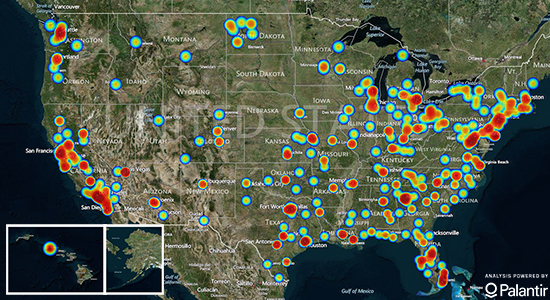A teenage girl uses cash to rent a room with an older man. A housekeeper, who appears to be living on site, nervously averts eye contact when a guest approaches. A string of men enter and leave a particular room throughout the night, each staying for only 30 minutes at a time.
These are just a few signs that human trafficking could be happening in your hotel.
The hotel industry is one of many venues human traffickers use to exploit their victims. In fact, domestic sex trafficking is one of the largest forms of human trafficking in the U.S., with the commercial sex acts commonly happening in hotels. The ability to pay for rooms in cash or to change rooms or hotel locations on a nightly basis can make it easy for pimps and traffickers to avoid detection -- and sex buyers also prefer the anonymity that purchasing sex in hotel rooms can provide.
In cases of labor trafficking, exploitation can be present within the hotel industry y's supply chains. Franchise owners unknowingly contract with vendors, such as recruitment agencies and cleaning crews, that may appear legitimate on the surface, but are in fact abusing employees. Victims can face wage and hour abuses, contract fraud, wrongful termination, discrimination, or unsafe working conditions and abuse. It is especially hard for these victims to seek help because certain types of staff, such as housekeepers or kitchen workers, are not always employed directly by the hotel and generally maintain a low profile among guests who could take notice of potentially exploitative situations.
Whether it is labor or sex trafficking, the bottom line for traffickers is just that: the bottom line. Human trafficking is a business - one that is estimated to create $150 billion a year in profits. Traffickers have been able to reap these profits with little risk when attempting to operate within hotels and motels.
If our society is to truly eradicate human trafficking, it is essential that the hotel industry recognize the central role it plays in not only responding to modern slavery, but preventing it in the first place. Traffickers know and capitalize on the fact that staff, managers, and executives often do not know what to look for, what questions to ask during contract negotiations with vendors, or even that human trafficking can happen at their hotels.
This must change. We must increase that risk for traffickers.
That's why it is exciting hotel companies are taking proactive steps to confront human trafficking head on. Wyndham Hotel Group deepened its partnership with Polaris in 2014, taking training with franchise owners to a new level focused on action and outcomes. Wyndham is also encouraging staff to donate unused rewards points to Polaris so we can provide emergency shelter at hotels for victims who need it. Over ten years ago, Carlson led the industry as one of the first major hospitality companies to speak out against modern slavery and the sexual exploitation of children. Polaris developed a training curricula for Hyatt Hotels Corporation, and now they've trained more than 45,000 employees across the globe on human trafficking. Both Hilton and Starwood Hotels and Resorts are tackling the issue with trainings too.
Training hotel workers on how to recognize the red flags of sex and labor trafficking can have a major impact on our ability to help victims and survivors of this crime get the help they need. Through the National Human Trafficking Resource Center (NHTRC), which is operated by Polaris and is the country's national lifeline for victims of human trafficking, we've already learned of more than 1,400 reports of human trafficking at hotels and motels. Three quarters of the reports made to the NHTRC about the hotel industry came from people who either observed suspicious activity or who had some level of contact with a potential victim. This highlights the critical role that community members and hotel workers can play in identifying potential human trafficking.
A person who pays for a room in cash or requests a room overlooking a parking lot. The presence of drugs and sex paraphernalia or excessive foot traffic in and out of a hotel room. Someone with no control of their money, cell phone, or ID, and whose communications are restricted or controlled. People prevented from taking adequate breaks or who are forced to meet daily quotas and turn over wages. These are all red flags indicating the presence of human trafficking, which could be caught by well-trained managers and observant hotel workers.
The hotel industry cannot ignore what so many of us know to be happening on their properties. We strongly urge more hotel chains to follow in the footsteps of those in their industry that are already taking action. Train staff about human trafficking and how to report it. Ask your subcontractors about their recruitment practices and the labor brokers they may use. Develop protocols for when trafficking is suspected. Consider vendor contacts with responsibly sourced products. Sign on to "The Code of Conduct for the Protection of Children from Sexual Exploitation in Travel and Tourism," developed by ECPAT, the United Nations World Tourism Organization, and UNICEF. Contact the NHTRC at 1-888-373-7888 or Polaris's BeFree Texting Helpline (233733) for help or to report a situation.
If the hotel industry is able to eliminate hotels and motels as venues for traffickers to operate, they can help disrupt traffickers' business. This is a major way that we can work towards eradicating modern slavery, while helping survivors rebuild their lives.
